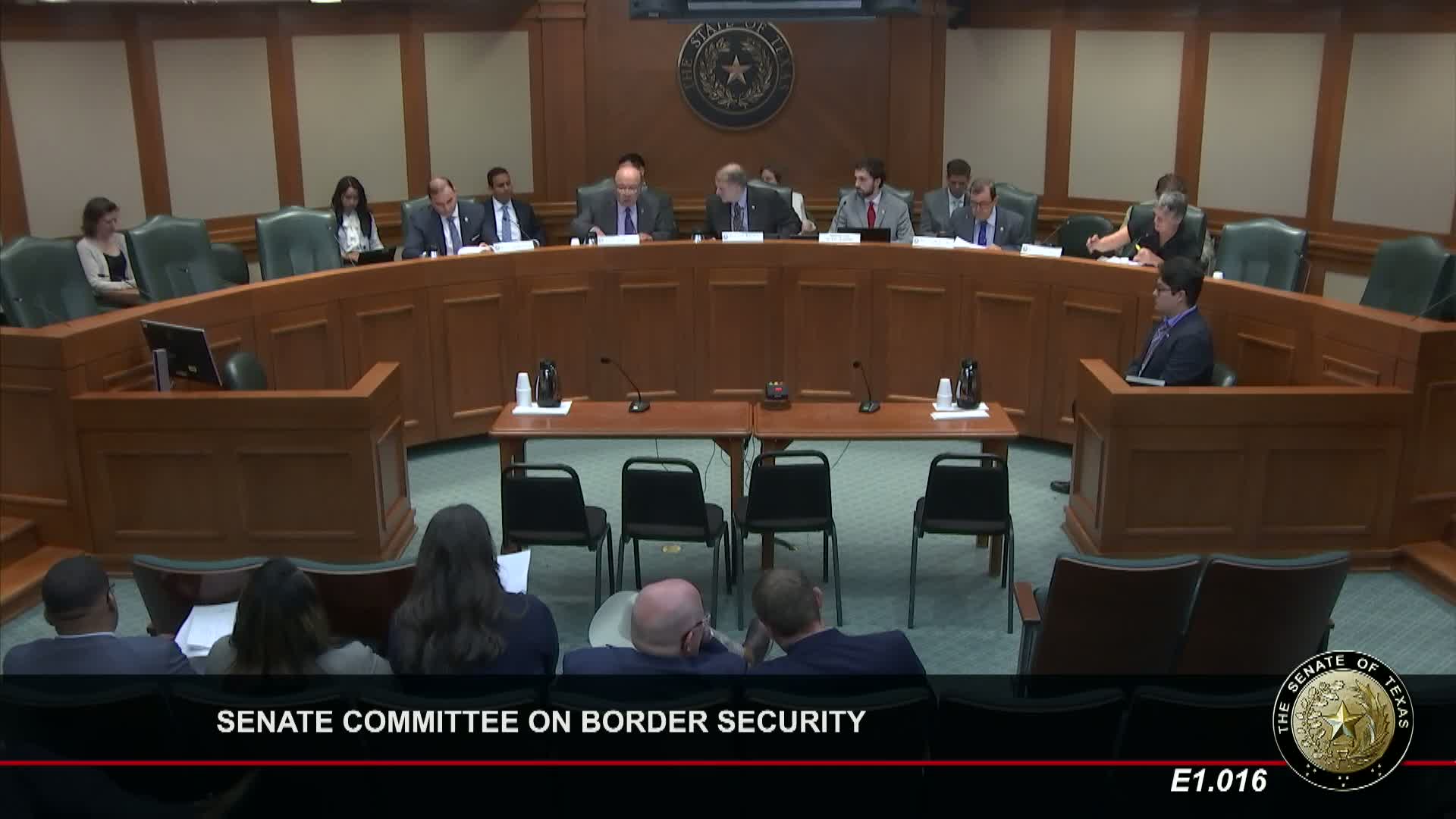Senate committee hears bills to curb unregulated fuel depots and off‑route overweight fuel transports
Get AI-powered insights, summaries, and transcripts
Subscribe
Summary
The Senate Committee on Border Security heard testimony on proposals to tighten documentation, licensing and criminal penalties for motor fuel transport after witnesses described unregulated “fuel depots,” transloading and overweight trucks used to move fuel southbound to Mexico.
The Senate Committee on Border Security spent its hearing time focused on bills that would tighten oversight of motor fuel transport along the Texas–Mexico border, increase penalties for off‑route and overweight fuel hauls, and close tax-reporting gaps that witnesses said organized criminal networks exploit.
The discussion centered on Senate Bill 2949 by Sen. José Hinojosa of Hidalgo, which the author described as aimed at “enhancing public safety around fuel transportation and ensuring compliance with the tax code” by expanding shipping documentation, licensing and reporting; creating civil and criminal penalties; and narrowing exemptions for so‑called flash title sales. Committee substitutes also were offered for related bills by Sen. Brian Birdwell (SB 2200 and SB 2199). SB 2200’s committee substitute was adopted in committee; other measures were left pending for additional testimony after the committee recessed for the floor session.
Why it matters: multiple resource witnesses told the committee that illegal transloading at unregulated fuel depots and falsified shipping documents have become tools for criminal groups to inflate volumes, avoid taxes and move fuel southbound for illicit resale — producing environmental hazards, roadway damage and public‑safety risks. "Unregulated fuel depots and illegal transloading operations have emerged as key elements of this criminal activity posing serious risk to public safety, the environment, and state commerce," said Sen. José Hinojosa, the author of SB 2949, describing the problem the bill seeks to address.
What witnesses said: Justin Scott, chief director of law enforcement at the Comptroller’s Office, described an operation tied to the depots last year that led to arrests and a surge in license applications: “We made 15 arrests in 2 days and it was a 4 day operation. In the last 2 days, they stopped. So there was no activity or very little activity… we saw over 200 applications filed the very next week with our account maintenance division for people needing the motor fuel transporter's licenses.” Scott and other comptroller witnesses reported finding false manifests, potential blending outside terminals and unlicensed motor fuel transporters.
Major Omar Villareal of the Texas Department of Public Safety (DPS) told senators the problem has evolved from port‑based schemes to depots on private land and off‑route movements that place heavy, often improperly configured cargo tanks into regular traffic. "It's a very complex issue because it's evolved quite a bit over the past several years," Major Villareal said, describing fuel transfers in agricultural fields, contamination from leaking pumps and catastrophic crashes involving overweight cargo tanks. Villareal said DPS has encountered tankers weighing far above legal limits — in some cases more than 150,000 pounds — and described cartel tariffs that push haulers to consolidate loads to reduce fees when crossing into Mexico.
Craig Britzloff, director of compliance and enforcement at the Texas Commission on Environmental Quality (TCEQ), described recurring contamination at depot sites and explained TCEQ’s enforcement options under Texas law: chapter 26 of the Texas Water Code (including subchapters D and G) requires cleanup when regulated substances are discharged and allows the agency to require cleanup or contract for cleanup and pursue cost recovery.
Points of debate and clarification: senators asked whether specifying three‑axle cargo tanks in some bills could create loopholes (by allowing operators to change axle configurations), whether penalty enhancements against drivers would simply result in replacing one expendable driver with another, and whether criminal penalties against drivers are the most effective tool to reach the entities profiting from the trade. Senator Eckhart raised concerns about strict liability and penalty class; Sen. Hinojosa and witnesses said statutes already include a range of penalty classes and the bill language was intended to align with those precedents.
Industry and port testimony: port operators and industry representatives urged care so legitimate export operations are not unduly harmed. Luis Bazán (director, Far International Bridge) and other port witnesses said the ports support lawful exports and described investments in infrastructure and procedures; they also warned of potential reductions in crossings and revenue if the bill were interpreted to restrict legitimate cross‑border exports. John Esparza of the Texas Trucking Association said divisibility rules and the standard 80,000‑pound limit matter for lawful carriers and urged careful tailoring to avoid unintended consequences for ordinary freight movements.
Committee action and next steps: the committee received public testimony and resource witness briefings, adopted a committee substitute for SB 2200 in committee, and left several bills pending for additional testimony and follow‑up after the committee recessed to attend floor business. Committee staff said they plan to reconvene the hearing after the floor session to complete invited witness testimony and further consideration of the measures.
Ending: senators and witnesses agreed the illicit fuel trade combines environmental, tax and public‑safety risks and that legislation should try to deter illegal depots and transloading while preserving legitimate export commerce. The committee left the bills pending and will resume consideration after the afternoon floor session.
